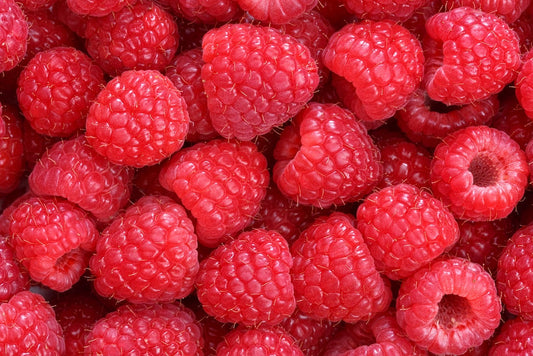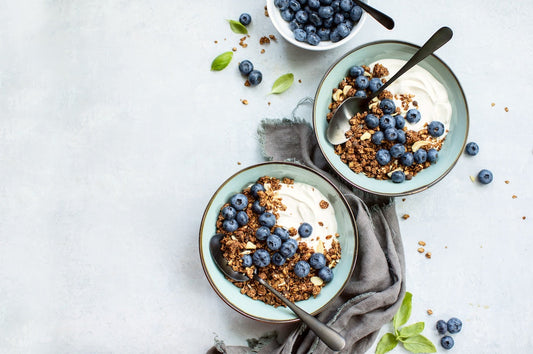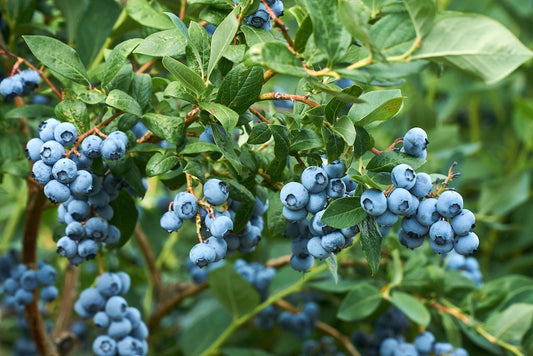Apple or banana? Banana or apple?
We will take a closer look at the question underlying this article: “Which is healthier, apples or bananas?”
You will learn more about these types of fruit and how they can help you meet your daily nutritional needs and improve your overall well-being.
In general, we will focus on the importance of healthy eating and the special role that fruit plays in this. A balanced diet is crucial to your healthy life, and fruit plays an important role in this context. You should eat several servings of fruit every day if possible.
Banana – learn everything there is to know!
Nutritional value and ingredients – a comparison of apples and bananas
When it comes to a nutritious and healthy diet, apples and bananas are often the center of attention. Both are not only popular worldwide, but are also a real treasure trove of nutritional value and health-promoting ingredients.
But what makes these everyday fruits true superheroes in your diet? In the following sections, we will reveal the hidden secrets behind the simple skin of these fruits and discover how they can enrich your health in a variety of ways.
Apple nutrients
The apple is truly a symbol of health and well-being. It is a source of valuable ingredients.
Apples are rich in vitamin C, a vital nutrient that is essential for numerous bodily functions. Vitamin C boosts your immune system, promotes collagen production for healthy skin, and acts as a powerful antioxidant that protects your body cells from damage. Eating apples regularly can thus contribute to improved health and resistance to various diseases.
Another important component of apples is pectin, a type of soluble fiber. Pectin not only aids in digestion, but also helps regulate blood sugar levels and lower cholesterol. Due to its gel-forming properties in the intestines, pectin helps you feel full longer and can thus play a role in your weight management.
| Nutrient | per 100 g apple |
| Calories | 52 kcal |
| Carbohydrates | 11.4 g |
| Dietary fiber | 2.4 g |
| Fat | 0.4 g |
| Protein | 0.3 g |
| Potassium | 107 mg |
| Calcium | 5 mg |
| Magnesium | 5 mg |
| Sodium | 1 mg |
| Vitamin C | 0.5 mg |
Apple – find out everything you need to know!
Banana Nutrients
This yellow wonder of nature is very popular with athletes and fitness enthusiasts, and not without reason.
A balanced combination of training and the right nutrition is crucial for building muscle. Bananas are particularly valuable in this context because they are rich in essential nutrients that are crucial for your muscle recovery and growth. A key nutrient in bananas is vitamin B6, which plays a central role in energy conversion and thus supports the performance and endurance of your muscles.
Furthermore, bananas have a moderate glycemic index, which means that they cause your blood sugar level to rise slowly and evenly. This is particularly beneficial for a constant supply of energy, both during intense workouts and other sporting activities. Bananas are therefore the perfect snack to keep you energized before or after your workout.
An interesting aspect is that unripe bananas have a higher proportion of resistant starch. This is digested more slowly, which contributes to a lasting feeling of satiety and can thus be helpful in the context of weight management and for maintaining stable energy levels.
So bananas are an excellent choice for you if you want to build muscle and are looking for a reliable source of healthy energy. The nutritional values of bananas at a glance in the table:
| Nutrient | per 100 g banana |
| Calories | 95 kcal |
| Carbohydrates | 20 g |
| Dietary fiber | 2 g |
| Protein | 1.2 g |
| Fat | 0.2 g |
| Potassium | 367 mg |
| Magnesium | 30 mg |
| Vitamin C | 11 mg |
| Calcium | 7 mg |
| Sodium | 1 mg |
| Iron | 0.4 mg |
| Vitamin E | 0.3 mg |
Comparison of fructose and vitamin values
An important aspect when comparing apples and bananas is the content of fructose and vitamins.
Apples are known for their moderate sugar content and high vitamin C content, which is very important for your immune system and overall health.
Bananas, on the other hand, have a slightly higher fructose content, which is a quick source of energy, as well as a considerable amount of vitamin B6, which is important for energy production and your nervous system.
We would also like to briefly mention kiwi here, as it has a high vitamin C content as well as a moderate sugar content, which also makes it an excellent choice for a balanced diet – however, it is often consumed less frequently than its apple and banana counterparts.
Recommendations for consumption
There are a few tips for getting the most out of apples when it comes to their health benefits. Apples are an excellent food for a healthy breakfast as they are rich in important nutrients. You can easily incorporate them into a variety of recipes, whether it's in muesli, smoothies or as a healthy snack between meals.
Apples
The saying “An apple a day keeps the doctor away” reflects the many health benefits of regular apple consumption.
Ideally, you should eat the whole apple with the peel. The peel contains a large proportion of the fiber and antioxidants. The core is also an important source of fiber.
Different apple varieties offer different nutrient profiles. By eating different varieties, you can get a wider range of nutrients.
Try to incorporate apples into your diet regularly and daily.
Combine them with other fruits, vegetables, whole grain products, lean proteins and healthy fats. This will give you a powerful nutritional boost.
Try to think of different ways to incorporate apples into your meals – whether it's in salads, smoothies, as a healthy snack between meals or in baked dishes.
Choose fresh apples, as they offer the most nutrients. Storage and processing can affect the nutrient content, so fresh, unprocessed apples are more nutritious and the best choice.
If possible, choose organic apples, as they contain fewer pesticide residues, which is especially important if you want to eat the peel.
Bananas
You can eat bananas in a variety of creative ways. For example, in smoothies, baked in banana bread, or as a natural sweetener in oats, yogurt, and porridge. Bananas are particularly suitable as a raw snack between meals – especially since they come practically packaged in their own skin.
The ideal ripeness of a banana depends on your personal taste and health needs. While fully ripe bananas are sweeter and provide energy faster, unripe bananas contain more resistant starch, which aids digestion and keeps your blood sugar level stable.
Keep bananas at room temperature until they have reached the desired degree of ripeness. To slow down the ripening process, you can then store them in the refrigerator. However, keep in mind that the peel will turn brown.
If possible, you should always choose organic quality, because then you can be sure that you are consuming as few undesirable ingredients as possible.
By the way: you shouldn't store bananas right next to apples. Apples give off the ripening gas ethylene, which causes the bananas to ripen at a record pace and often too quickly.
Bananas – everything you need to know!
Effects on special diets
Apples and bananas play an important role in special diets such as low-carb diets and diabetes diets. Although both fruits naturally contain sugars, they provide important nutritional value through their fiber, vitamin, and mineral content. Read more about the fiber in bananas.
In low-carb diets, you can enjoy apples and bananas in moderation because they contain natural sugars and carbohydrates. It is advisable to keep an eye on the total sugar content and to consume the fruit within your daily carbohydrate limit.
In terms of diabetes diets, both apples and bananas, especially the green, less ripe varieties, can be helpful. Their fiber content can help stabilize your blood sugar levels and prevent sudden spikes after eating.
The important thing here is to keep an eye on portions and to consider fruit as part of your overall daily carbohydrate intake. Adding oats to apples can be an excellent addition to create a balanced meal with a good mix of carbohydrates, proteins and fats.
In short, apples and bananas can play a useful role in specialized diets such as low-carb or diabetic diets, as long as you consume them consciously and in appropriate amounts.
The banana diet
The banana diet is a simple and popular method of losing weight that became popular mainly in Japan. It is based on the concept that eating the yellow fruit for breakfast and avoiding late dinners and snacks can lead to weight loss. So bananas can help you lose weight. Here are the basic principles of the banana diet:
Bananas for breakfast: Start your day by eating bananas. There is no set number; eat until you feel full. The bananas should be raw and unprocessed if possible.
Water with breakfast: Drink a glass of lukewarm water with breakfast. This is to aid digestion and to boost your metabolism.
Normal lunch and dinner: There are no strict guidelines for lunch and dinner. However, it is recommended that you eat healthy and balanced meals.
Avoid desserts after meals: It is advised that you avoid desserts after main meals.
Eat dinner early: Try to finish your dinner before 8 p.m. Avoid eating late at night.
Go to bed before midnight: Go to bed early enough to get enough sleep.
Snacks are allowed: Light snacks are allowed between meals, but they should be healthy.
Exercise: Physical activity is recommended to maximize the health benefits of the diet.
The banana diet emphasizes simplicity and ease, as it does not require strict calorie counting or complicated meal plans. However, it is important to note that this diet may not necessarily be suitable for everyone and a balanced diet and regular exercise are crucial for long-term health and weight management.
Porridge with banana – discover it now!
Conclusion
In conclusion, we would like to stress that both apples and bananas can make valuable contributions to your diet. They provide a wealth of nutrients that are important for various bodily functions, from energy supply to supporting your immune system.
Bananas and apples are also the first fruits that children consume when they start eating solid foods. So if you are already a mom or dad, you should definitely offer your child these two types of fruit – now you know even more precisely why they are so valuable.
Your individual diet should be tailored to your personal health goals and needs. You can incorporate apples and bananas into your diet in a variety of ways, from eating them raw to using them in creative recipes. Remember that nutrition is only one part of a healthy lifestyle. Regular exercise and taking care of yourself are equally important to get the most out of the nutritional benefits of apples and bananas.
There is no clear answer as to which is healthier or better for your health. Both are extremely valuable and depending on your nutritional goals, you should give them priority. A combination of both is probably the best option anyway! Verival hopes you enjoy eating healthy!
Frequently asked questions
Which is better for your daily vitamin needs, apples or bananas?
Both apples and bananas are excellent choices for your daily vitamin needs. Apples are high in vitamin C and pectin, making them an ideal fruit for immune and digestive health. Bananas provide a good dose of vitamin B6 and vitamin A, which are important for energy production and vision. The choice should be made based on individual nutritional needs and preferences.
Can apples and bananas help control weight?
Yes, apples and bananas can help with weight management. Apples are low in calories but high in fiber, which promotes a feeling of satiety for longer. Bananas, especially unripe ones, contain resistant starch, which boosts the metabolism and helps burn fat. Both are useful components of a balanced, healthy diet.
How do apples and bananas affect blood sugar levels?
Apples and bananas have different effects on blood sugar levels. Apples, with their high pectin content, have a moderate effect on blood sugar. Bananas, on the other hand, can raise blood sugar levels more quickly, especially when they are very ripe. Their glycemic index varies depending on their degree of ripeness.
Are apples or bananas better for athletes?
Both apples and bananas are great for athletes. Apples provide long-lasting energy and are rich in antioxidants that can reduce muscle fatigue. Bananas are ideal for a quick energy boost and support muscle building through their vitamin B6 and mineral content.
What role do apples and bananas play in a heart-healthy diet?
Apples contain antioxidants and pectin, which can help lower cholesterol and support the cardiovascular system. Bananas provide potassium, which is important for maintaining healthy blood pressure.
How can you incorporate apples and bananas into your diet in a variety of ways?
Apples and bananas can be incorporated into your diet in many creative ways. Add them to oatmeal for a healthy breakfast, blend them in a smoothie, or enjoy them as a healthy snack between meals. You can also bake apples or add them to salads, while bananas are great for desserts or as a natural sweetener.
Which is better for losing weight, bananas or apples?
Both bananas and apples are useful for weight loss. Apples have fewer calories and are high in fiber, making them a good option for weight management. Bananas, especially the unripe ones, contain resistant starch that can help increase satiety. The choice should be based on personal taste and how they fit into a balanced diet.
Which has more sugar, apples or bananas?
The sugar content can vary in apples and bananas, but bananas generally have a higher fructose content. Ripe bananas contain more sugar than unripe ones, while apples have a more moderate sugar content that affects blood sugar levels more slowly.
Is it healthy to eat a banana every day?
It is perfectly healthy to eat a banana every day as long as it is part of a balanced diet. Bananas offer important nutrients such as vitamin B6, potassium, and magnesium. They are also a good source of quick energy and can help regulate blood sugar levels.
Which has more carbohydrates, banana or apple?
Bananas generally contain more carbohydrates than apples. The carbohydrates in bananas are mostly sugars and starches, especially in more mature bananas. Apples have fewer carbohydrates and also provide fiber, making them an excellent option for a carb-conscious diet.
























